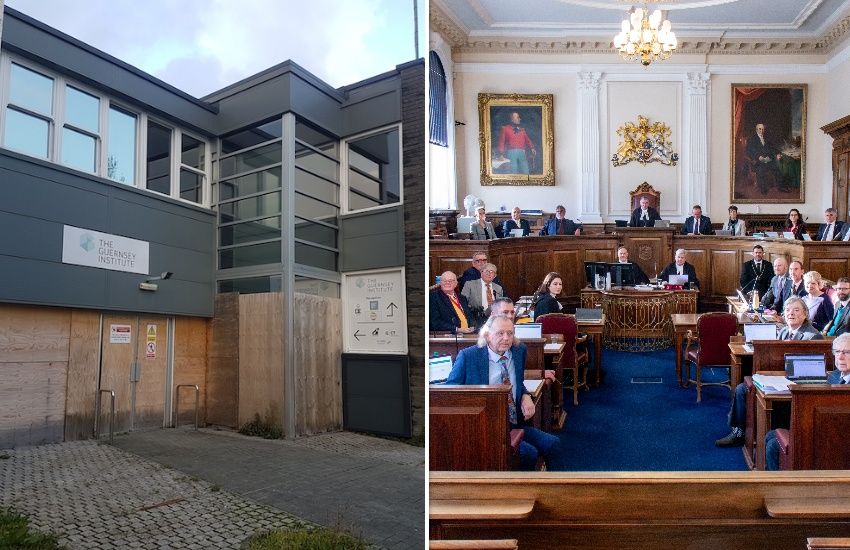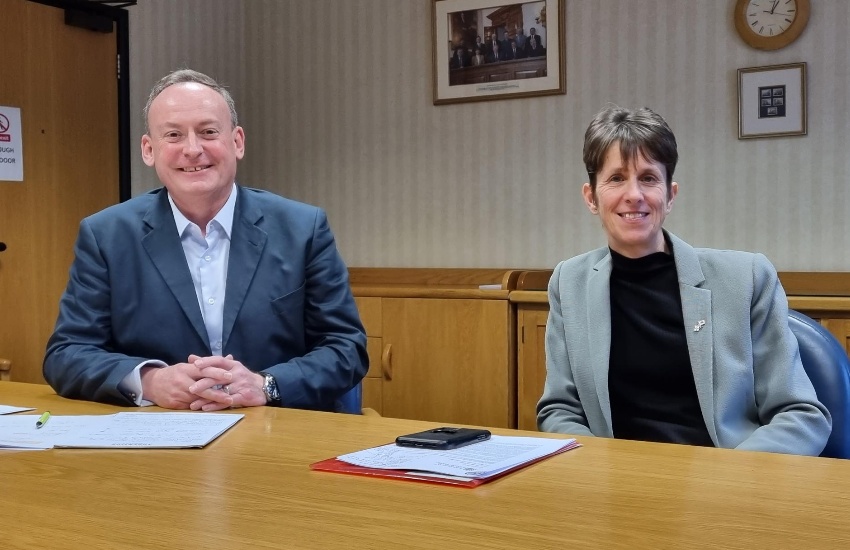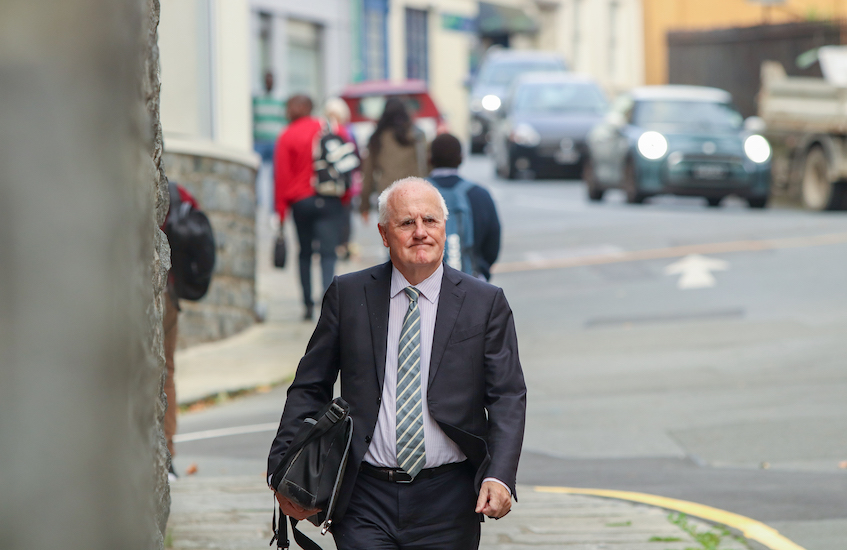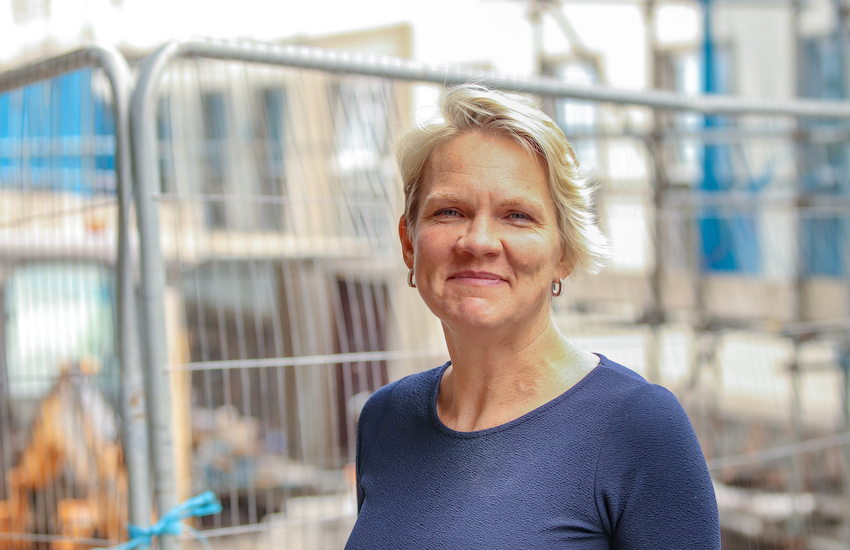


Deputies have supported the £88m funding of the first phase of the Les Ozouets post-16 education campus, which includes laying foundations for a future sixth form centre.
Deputies Lyndon Trott and Heidi Soulsby presented two options to States members today – to spend £87m to deliver the Guernsey Institute facilities while pausing the sixth form centre and sports facilities for the next few years, or to spend an additional £1m on laying the foundations for the sixth form too.
It will be funded by using up to £33m from reserves and taking out up to £55m of borrowing, repaid through a £20m annual increase in taxes expected to be collected from large multinational corporations due to global tax reforms by 2026.
Most of P&R and Education had strongly recommended laying the foundations for the sixth form now, with Deputy Trott arguing it represents better value for money and would cause less disruption to those working in the Institute.
Critical deputies questioned laying foundations for a building which a future States may decide is no longer desired or is designed to unsuitable specifications.
Deputy Trott opened debate by drawing on the “dual drivers” of the need for education, skills, and housing.
“Both are key enablers to drive the economy,” he said, saying the funding had been made possible through “a strong economy, a degree of compromise, and a pinch of good fortune."
He “warmly” thanked Education for working with them to agree a solution: “It is how I remember the Guernsey politics of yesteryear and it is great to see it back in play."
“Everyone should leave feeling like they haven't got quite what they wanted.”

Pictured: Deputies Trott and Soulsby unveiled the options on Monday.
Concerns were raised in debate over the accuracy of the significant upgrade in forecasted revenues
He called the updated estimates to the OECD Pillar Two tax charges “reliable” and were borne out of quarterly appraisals for States revenue which included 2022 company tax returns and the up-to-date approach of other jurisdictions including the US.
This was not available to the previous Policy & Resources Committee, he added.
It was this information which allowed the amendment to be drawn up, and Deputy Trott rejected suggestions that P&R had “simply manipulated information in a manner that makes this deliverable”.
While Treasury is unable to predict behavioural changes that will result from the reforms, they are confident to use it as a central planning assumption.
In his first meeting since being ousted as P&R President, Deputy Peter Ferbrache offered his support but regretted that the sixth form and sports facilities were unable to proceed in tandem.
He also chastised Treasury for advice given to the committee while it was under his leadership on corporate tax.
“An upgrade by a multiple of three is unacceptable... I asked 50, 60, 70 times if we could rely on the £10m figure, we were told yes, yes, yes. That was the advice we gave to the States.... not only was it wrong but it was badly wrong,” he said.

Pictured: Deputy Peter Ferbrache.
His former Committee member, Deputy David Mahoney scorned the idea, saying he didn’t believe the upgraded forecast from Treasury and asked P&R to show their workings to prove they weren’t “magicked up”.
“Even if it’s correct, there are so many variables that are entirely outside the control of this Assembly. I don't think we should be relying on them.... We think we might get from £10m to £30m, and therefore we should take out a whole bunch of borrowing. That's just unfunded borrowing to me.”
He also criticised the decision to spend general reserves, especially considering the States’ recent decision to plunder a £90m health pot to fund the hospital redevelopment: “To add another £30m just doesn’t wash with me."
Deputy Trott later said the advice the previous committee received “was the advice staff believed at the time based on the information they had”.
Deputy De Lisle also expressed reservations about borrowing and a lack of certainty “with regards to the numbers for Pillar 2” and when those new taxes would start to be collected.
Those concerns were compounded by Deputy Sasha Kazantsva-Miller who said limited forecasting is hamstringing the States' ability to make long-term planning on various policy objectives.
She said it's incredible that within 12 months the States is now expected to raise as much money as proposed in the former P&R's GST tax package after the corporate tax revision.
"This forecast could also change quite quickly, and overnight."
The better-than-expected economic performance in 2022 was mainly driven by high banking profits created through the rise in interest rates, she added.
But she argued that taking a phase approach “to solving some of the biggest issues we have” is a sensible way to proceed.

Pictured: Deputy Sasha Kazantseva-Miller.
Deputy Peter Roffey hesitantly supported the plans fearing their unaffordability and the possibility of a future States going cold on the sixth form centre after foundations had been constructed.
“We are stretching the amount we are borrowing and spending from reserves without having put in place sustainable reforms to public finances,” he said, and funding Les Ozouets may be “nailing to the coffin” the need for future tax rises.
Education member, Deputy Andy Cameron, who previously indicated a lack of support for the amendment said his “main problem is not what's in it, but what’s not in it”, referring to using La Mare as a temporary sixth form.
Another Education member, Deputy Susan Aldwell, refuted his criticisms, saying it would be millions cheaper to get La Mare up to scratch rather than extending Les Varendes to accommodate additional students.
But later in debate Deputy Lindsay de Sausmarez revealed that she and Deputy Roffey had met with the consultants who were highly critical of the state of of La Mare’s building, saying they had given a two-year timeframe for it due to “concerns over the structural integrity of the facade”.
Summing up, Deputy Trott accepted there are several uncertainties going forward, such as the UK and US elections which could bring about a change in direction of global tax rules.
But he said those can be understood and managed, while praising the Assembly for collegiate working: “So much more can be achieved when we are both pragmatic and optimistic."
A bonus is that the States can now prepare to release the Coutanchez site, currently used by the Guernsey Institute, for new housing.
Comments
Comments on this story express the views of the commentator only, not Bailiwick Publishing. We are unable to guarantee the accuracy of any of those comments.